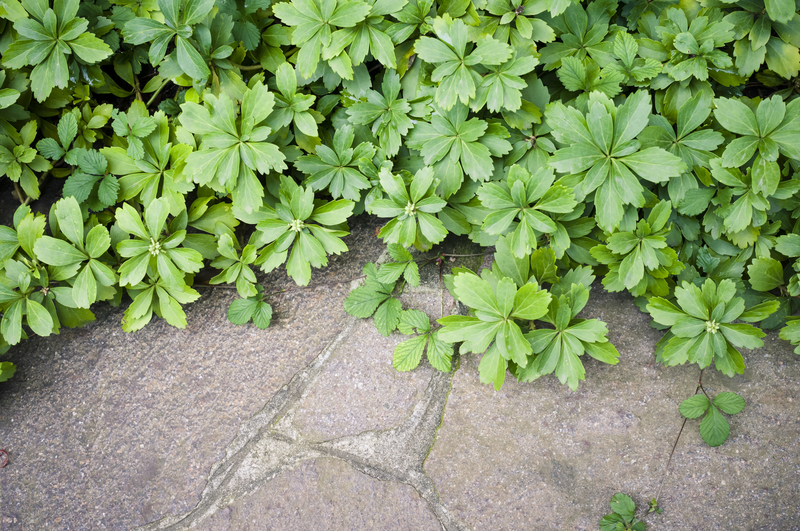Creating Tranquility: Zen Garden Ideas for Your Peaceful Retreat
Posted on 26/08/2025
Creating Tranquility: Zen Garden Ideas for Your Peaceful Retreat
If you're searching for ways to infuse your home or outdoor space with serenity and balance, look no further than the timeless beauty of a Zen garden. Rooted in ancient Japanese philosophy, Zen gardens--also known as karesansui or Japanese rock gardens--invite calmness, clarity, and reflection. In today's fast-paced world, crafting a peaceful retreat is more important than ever, and with the right Zen garden ideas, you can carve out your own haven of tranquility.
What Is a Zen Garden?
A Zen garden is a minimalist landscape composed of elements such as rocks, gravel, sand, moss, and carefully pruned shrubs. These features are thoughtfully arranged to symbolize natural landscapes and evoke a sense of peace and harmony. Unlike traditional gardens, Zen-style spaces are about fostering mindfulness and contemplation rather than showcasing a wide variety of blooming flowers or lush greenery.
Origins of Zen Gardens
Zen gardens date back to the Muromachi period in Japan (14th-16th centuries), inspired by Zen Buddhist philosophies that emphasize simplicity, focus, and meditation. Monks would meticulously rake patterns in gravel or sand, representing water ripples or waves, and arrange rocks to suggest islands or mountains. These landscapes became outdoor sanctuaries for meditation and self-reflection, providing a peaceful environment that helped practitioners achieve inner peace.

Why Choose a Zen Garden for Your Retreat?
- Stress Relief: The act of creating and maintaining a Zen garden can reduce stress and encourage relaxation.
- Mindfulness: The simplicity of a Zen haven encourages presence and mindful observation of your surroundings.
- Low Maintenance: With minimal plantings and no need for a lush lawn, Zen gardens are easier to care for than traditional gardens.
- Year-Round Tranquility: Zen-inspired designs offer visual interest all year with stones, sand, and evergreen elements.
- Personal Retreat: Your Zen sanctuary becomes a place to disconnect, meditate, or simply enjoy serene moments alone or with loved ones.
Essential Elements of a Zen Garden
Before diving into design ideas, it's important to familiarize yourself with the essential components that bring a Zen garden oasis to life:
- Rocks and Stones: Representing islands, mountains, or animals, rocks are the focal points of a Japanese Zen garden.
- Sand or Gravel: Spread across the space, these materials are raked into rippling patterns to mimic water and instill calm.
- Moss: A lush, velvety groundcover that infuses the garden with softness and symbolizes longevity.
- Water Features: While traditional Zen gardens may have dry waterfalls made of stones, small ponds or bamboo fountains can provide a soothing ambiance.
- Plants: Minimalist evergreens, ferns, and carefully pruned shrubs are chosen for structure rather than showy blooms.
- Pathways: Thoughtfully placed stepping stones or gravel paths invite walking meditations and mindful movement.
- Fencing or Bamboo Screens: These create privacy and frame your tranquil retreat.
Best Zen Garden Ideas for Your Peaceful Haven
Ready to design your personal tranquil oasis? Let's explore comprehensive Zen garden design tips to help you transform any corner of your yard or indoor space into a sanctuary of peace.
1. Start Small: Indoor Zen Meditation Corners
Don't have a large outdoor area? You can still create a relaxing mini Zen garden inside your home. All you need is a tray, white sand, several smooth pebbles, a small rake, and perhaps a bonsai or moss ball. Place this on your desk, coffee table, or a sunlit windowsill. Raking the sand and rearranging the stones can be a meditative break during your day, instantly lowering stress levels and inducing calm.
2. Embrace Minimalism: Less Is More
The core of Zen garden aesthetics is simplicity. Select a few carefully chosen stones--each with unique shape and character--and cluster them artistically to create visual balance. Leave open stretches of raked sand or gravel to offer a sense of space and quiet reflection. Remember, in a Zen landscape, every item should have a purpose and place.
3. Create Stone Pathways for Mindful Walking
Stepping stone paths are iconic in Zen-inspired garden retreats. Lay out a gentle curve of flat stones through your garden. These invite slow, contemplative strolls and encourage you to savor the journey, not just the destination. Edging the path with moss or low ferns enhances the tranquil, grounded atmosphere.
4. Add Sound: Water and Bamboo Features
While classic dry Zen gardens use raked sand to symbolize water, the addition of real water features can enhance tranquility. Install a small bamboo fountain (shishi-odoshi) or a shallow pond with smooth black pebbles. The gentle trickle or gurgle of water can mask urban noise and provide soothing background ambiance, enriching the meditative quality of your outdoor retreat.
5. Incorporate Moss and Greenery
Moss is revered in Japanese design for its vivid color and soft, inviting texture. Incorporate clumps of moss around rocks or at the base of trees in shaded corners. Mix in evergreen shrubs, dwarf bamboo, or graceful Japanese maple for structure, without overwhelming your simple landscape with too many colors or varieties. Strive for a blend that looks natural, timeless, and harmonious.
6. Frame Your Space With Bamboo Screens or Fences
Privacy enhances the feeling of a secluded retreat. Surround your Zen haven with bamboo fencing, wooden slats, or living screens of tall ornamental grasses. These elements not only define your peaceful space but also buffer unwanted sightlines and sounds.
7. Use Lighting for Serenity After Dark
Outdoor lanterns, solar path lights, or subtle spotlights can highlight stone groupings and pathways without disturbing the garden's natural ambiance. Aim for soft, diffuse illumination rather than harsh floodlights, so your Zen retreat remains calm and inviting in the evenings.
8. Symbolic Arrangements: Balance and Asymmetry
Traditional Japanese Zen gardens often use odd numbers of rocks in arrangements to create natural, unforced beauty. Try placing three stones of varying sizes--a tall "mountain" stone, a mid-height "body" stone, and a flat "water" stone--for a composition that feels balanced yet organic. These symbolic groupings encourage contemplation and a deeper sense of harmony.
9. Introduce Meditation Spaces
Designate a flat area for sitting or walking meditation within your garden. You can lay down a simple wooden bench, a low stool, or a flat stone slab. Having a dedicated space for mindful activities greatly enhances the therapeutic benefits of your Zen-style retreat.
Tips for Maintaining Your Zen Garden Sanctuary
Maintenance is straightforward, but attention to detail is vital to retain a pristine, peaceful environment. Here are a few key tasks:
- Raking Patterns: Regularly rake the gravel or sand to maintain crisp lines and prevent weeds from taking root.
- Stone Cleaning: Brush rocks and pathways to remove debris, dirt, or moss overgrowth.
- Pruning: Trim shrubs or moss to preserve their shape and health--less is often more.
- Weed Removal: Keep the garden free of invasive plants that might disrupt the minimalist aesthetic.
- Water Feature Care: Change water and clean pumps to prevent algae build-up if you include a real pond or fountain.
Choosing the Best Materials for Your Zen Retreat
The sensory experience of your Zen oasis depends greatly on the materials you choose. Look for elements that not only fit your style but also stand up to your local climate.
Best Rocks for Zen Gardens
- Smooth beach pebbles
- Weathered granite boulders
- Slate or basalt stones
- River rocks
Choose stones with interesting shapes, colors, and textures for maximum effect.
Sand and Gravel Options
- White decorative sand for dry stream beds or open spaces
- Crushed granite gravel for long-lasting raking patterns
- Pea gravel for sweeping curves and easy walking paths
Plants Ideal for Zen Gardens
- Moss (sheet moss, cushion moss)
- Bamboo (dwarf, clumping varieties for control)
- Japanese maple (Acer palmatum)
- Evergreen yew, juniper, or boxwood shrubs
- Hosta, ferns, and grasses for softening edges
Stick to a limited and harmonious palette of plantings to maintain simplicity and Zen tranquility.
Zen Garden Decor: Accents and Accessories
For extra personality, consider these subtle finishing touches:
- Stone lanterns or pagodas
- Small Buddha statues or meditation figures
- Bamboo water spouts (kakei)
- Custom rakes for interesting sand patterns
- Wooden benches or low stools for seating
Avoid clutter--let each accent have room to "breathe," which is essential for that peaceful and balanced atmosphere.
How to Plan Your Zen Garden Layout
Creating a Zen garden retreat involves careful planning and intentional design. Here's a step-by-step guide to help you bring your tranquil oasis to life:
- Assess Your Space: Determine how much room you have and what level of privacy you desire.
- Select a Layout: Decide whether you want a dry landscape (karesansui), a stroll garden, or an indoor tabletop display.
- Mark Key Features: Place focal rocks and groupings first, then plan pathways and open gravel or sand areas.
- Add Greenery: Tuck in moss, shrubs, and minimal accent plants for texture and natural structure.
- Frame the Space: Install fencing, bamboo screens, or hedges for boundaries and seclusion.
- Install a Water Feature (Optional): If including a fountain or pond, situate it near a seating area for restful enjoyment.
- Accentuate with Decor: Add lanterns, statues, or benches sparingly for function and beauty.
Zen Garden Ideas for Small Yards or Courtyards
Not everyone has the luxury of a sprawling yard, but you can still design a compact, impactful Zen-style retreat:
- Use vertical elements like bamboo or trellis to create separation and privacy.
- Opt for finer gravel and smaller rocks to fit the scale of your space.
- Include a single striking boulder or a bonsai as the garden's focal point.
- Create a winding path or stepping stone loop for an illusion of distance.
- Use mirrors or reflective surfaces to visually expand the garden.

Benefits of a Zen Garden for Mental & Physical Wellbeing
Integrating a Zen garden into your lifestyle goes beyond aesthetics--it offers significant health benefits:
- Reduces stress: Gentle physical activity, visual harmony, and soothing sounds foster relaxation.
- Encourages mindfulness: Raking, pruning, or rearranging stones cultivates present-moment awareness.
- Improves concentration: Contemplative spaces help clear the mind for better focus and creativity.
- Promotes outdoor living: Spending time outdoors supports vitamin D production and boosts mood.
- Provides a personal sanctuary: Your tranquil retreat is a haven for meditation, yoga, or quiet hobbies.
Final Thoughts: Your Tranquil Zen Oasis Awaits
Creating tranquility through a Zen garden is a journey, not just a destination. From humble indoor trays to expansive backyard sanctuaries, the principles of simplicity, balance, and nature's beauty are within your grasp. Let your new peaceful Zen retreat become a wellspring of calm in your daily life--a place where silence speaks, and every stone, ripple, and leaf invites you to pause and find your center.
Start today--embrace the art of Zen garden design and watch as your home or yard transforms into a refuge of peace, reflection, and timeless beauty.
Latest Posts
Evergreen Climbers for Shade: Reviving Gloomy Spots
Creating a Dog-Friendly Garden Sanctuary
Exploring the Benefits of Container Gardening
Mastering Your Garden: Top 3 Tips for Effective Weed Control

